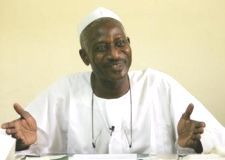Chadian opposition snubs Deby’s national dialogue
July 28, 2006 (N’DJAMENA) — The Chadian government on Friday launched a long-awaited national dialogue aimed at sealing differences with the opposition, but President Idriss Deby’s main opponents stayed away.
 With Deby facing attacks from rebels operating on the eastern border from Sudan, as well as high-level defections, mutinies and scathing criticism from the opposition, Chad’s international partners have called repeatedly for talks to bring all political factions together.
With Deby facing attacks from rebels operating on the eastern border from Sudan, as well as high-level defections, mutinies and scathing criticism from the opposition, Chad’s international partners have called repeatedly for talks to bring all political factions together.
“The country’s biggest challenge is to engage in a process of national dialogue and reconciliation in order to settle conflicts through dialogue rather than force, thus contributing to reducing poverty and improving development,” World Bank President Paul Wolfowitz said during a visit last week.
But the government did not invite rebel groups to sit at the table and the two main opposition movements consequently refused to join the 54 parties and civil society groups that turned up for the dialogue due to last until next Wednesday.
“We will not participate,” said Ibni Oumar Mahamat Saleh of the Coordination of Political Parties for the Defence of the Constitution (CPDC). “We want a national dialogue that excludes no one.”
But Prime Minister Pascal Yaodimnadji, who chaired the talks, bluntly refused. “We cannot make lawful that which is unlawful,” he said. He also accused the rebels of working for Chad’s enemies.
“How could a dialogue take place with those who have placed themselves at the service of foreigners?” he said. Chad cut diplomatic relations with Sudan on 14 April, a day after government forces repelled a rebel attack on N’djamena. Chad blamed Sudan for backing the rebels.
But the opposition maintains that excluding rebel groups from the talks will not help the return of peace.
Chad’s other major opposition grouping, Federation Action for the Republic (FAR), has also rejected an invite. “This dialogue is a masquerade,” said FAR MP Ngarledji Yorongar. “Deby is under pressure from the international community to talk to the opposition and is simulating a dialogue.”
On announcing the launch of a national dialogue last June, Deby had said the talks “will give Chadians the means and the political will to build their own country, while reinforcing the democratic experience.”
The decision was the president’s first overture to the opposition since holding presidential elections on 3 May in the face of a boycott by the Chadian opposition.
Since reports surfaced in 2004 that Deby was planning to change the constitution to run for a third presidential term, the political situation in Chad has been extremely fragile. Deby came to power in 1990 in a coup.
Discontent led to the creation of an armed rebellion but Deby nonetheless went ahead with elections on 3 May and was subsequently declared victor.
This week however, military representatives from Chad and Sudan agreed in N’djamena to stop hosting each other’s rebel forces in their territory. While Chad blames Sudan for backing the rebels, Sudan accuses Chad of supporting rebels in Darfur. Fighting there has pushed some 200,000 Sudanese refugees into Chad.
Under Wednesday’s deal, the two sides agreed to set up a joint military commission to monitor their shared border that stretches some 1,000 km north-south through the Sahara desert.
This military reunion comes ahead of a scheduled meeting between the two heads of state, President Idriss Deby of Chad and Sudan’s President Umar Hassan al-Bashir in the Senegalese capital, Dakar, in August. That meeting will be chaired by President Abdoulaye Wade of Senegal and could see the restoration of diplomatic relations between the two countries.
(IRIN)
